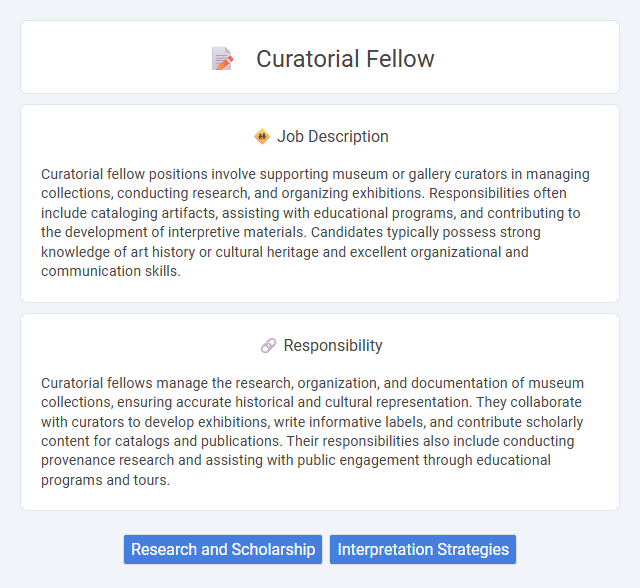
Curatorial fellow positions involve supporting museum or gallery curators in managing collections, conducting research, and organizing exhibitions. Responsibilities often include cataloging artifacts, assisting with educational programs, and contributing to the development of interpretive materials. Candidates typically possess strong knowledge of art history or cultural heritage and excellent organizational and communication skills.
Curatorial fellow positions likely suit individuals with strong research skills, attention to detail, and a passion for art or history. Those who thrive in collaborative environments and can manage multiple projects simultaneously may find this role more fitting. Candidates without a keen interest in cultural preservation or poor organizational abilities might face challenges in adapting to the demands of this job.
Qualification
A Curatorial Fellow typically requires a bachelor's degree in art history, museum studies, or a related field, with many positions favoring candidates holding a master's degree. Strong research skills, familiarity with collections management software, and experience in exhibition planning are essential qualifications. Proven expertise in cataloging artifacts and excellent communication skills for public engagement further enhance a candidate's suitability.
Responsibility
Curatorial fellows manage the research, organization, and documentation of museum collections, ensuring accurate historical and cultural representation. They collaborate with curators to develop exhibitions, write informative labels, and contribute scholarly content for catalogs and publications. Their responsibilities also include conducting provenance research and assisting with public engagement through educational programs and tours.
Benefit
Curatorial fellow positions likely offer valuable opportunities to gain hands-on experience in museum or gallery settings, enhancing skills in collections management and exhibition planning. These roles probably provide networking prospects with industry professionals and access to exclusive resources, aiding career development. Participants may benefit from mentorship and specialized training that increase their expertise and employability in the art world.
Challenge
Curatorial fellow positions likely present the challenge of balancing extensive research responsibilities with the need to innovate in exhibition design, requiring adaptability and creative problem-solving skills. Candidates may frequently encounter tight deadlines and resource constraints that test their organizational abilities and resilience. Navigating diverse stakeholder expectations and maintaining scholarly rigor while making art accessible could also pose significant challenges in this role.
Career Advancement
Curatorial fellow positions provide hands-on experience in museum collection management, exhibition design, and research, essential for professional growth in the arts and cultural sector. These roles often serve as stepping stones to curator or collections manager roles, enhancing expertise in art history, conservation, and public engagement. Building a network with industry professionals during a curatorial fellowship significantly boosts career advancement opportunities within prestigious institutions.
Key Terms
Research and Scholarship
Curatorial fellows engage in in-depth research to support the acquisition, documentation, and interpretation of collections within museums or galleries. Their scholarship involves analyzing historical and cultural contexts to contribute to exhibitions and publications that enhance public understanding. Collaboration with curators and scholars ensures the integration of new knowledge into institutional narratives and academic discourse.
Interpretation Strategies
Curatorial fellows develop innovative interpretation strategies to enhance audience engagement with museum collections and exhibitions. They analyze historical context and cultural significance to create educational content that resonates with diverse visitor demographics. Utilizing multimedia tools, they tailor narratives that deepen public understanding and foster meaningful connections to artworks and artifacts.
 kuljobs.com
kuljobs.com